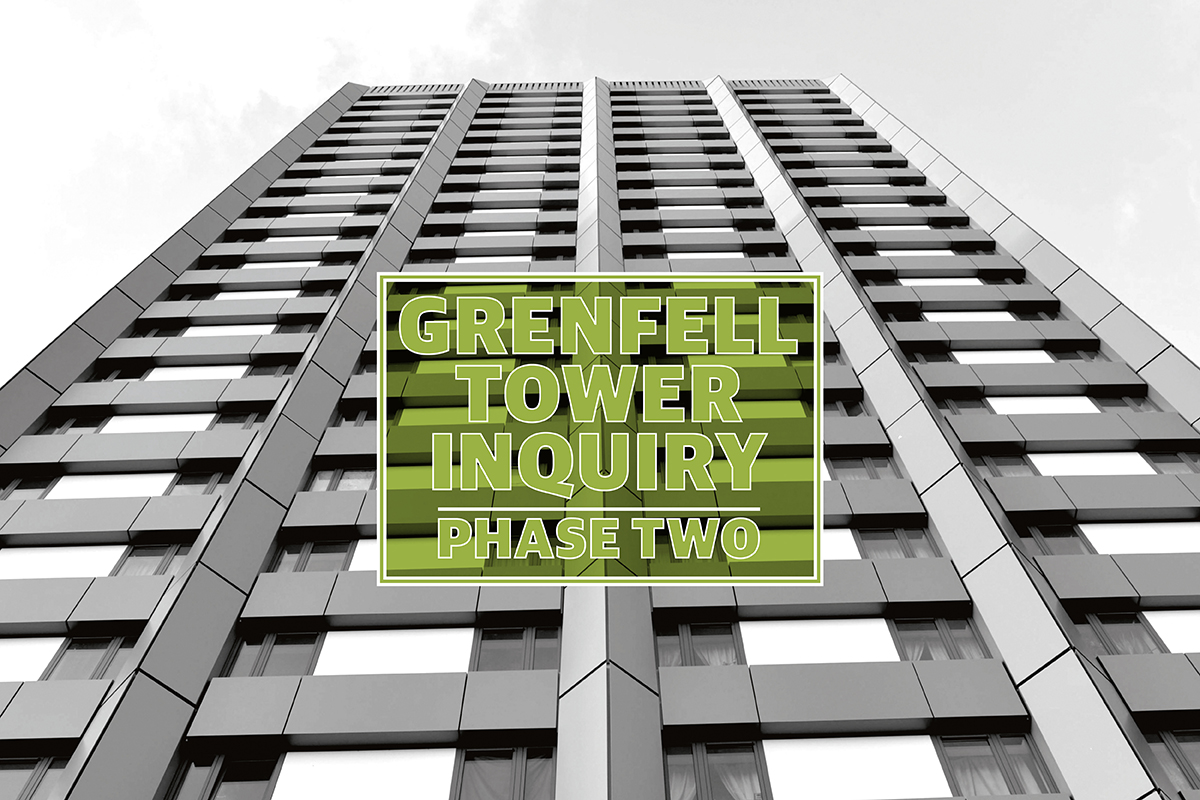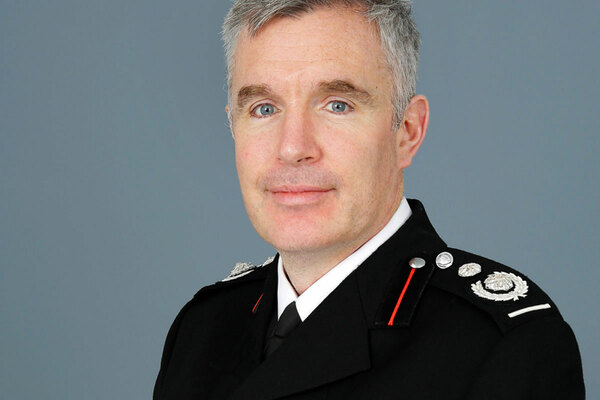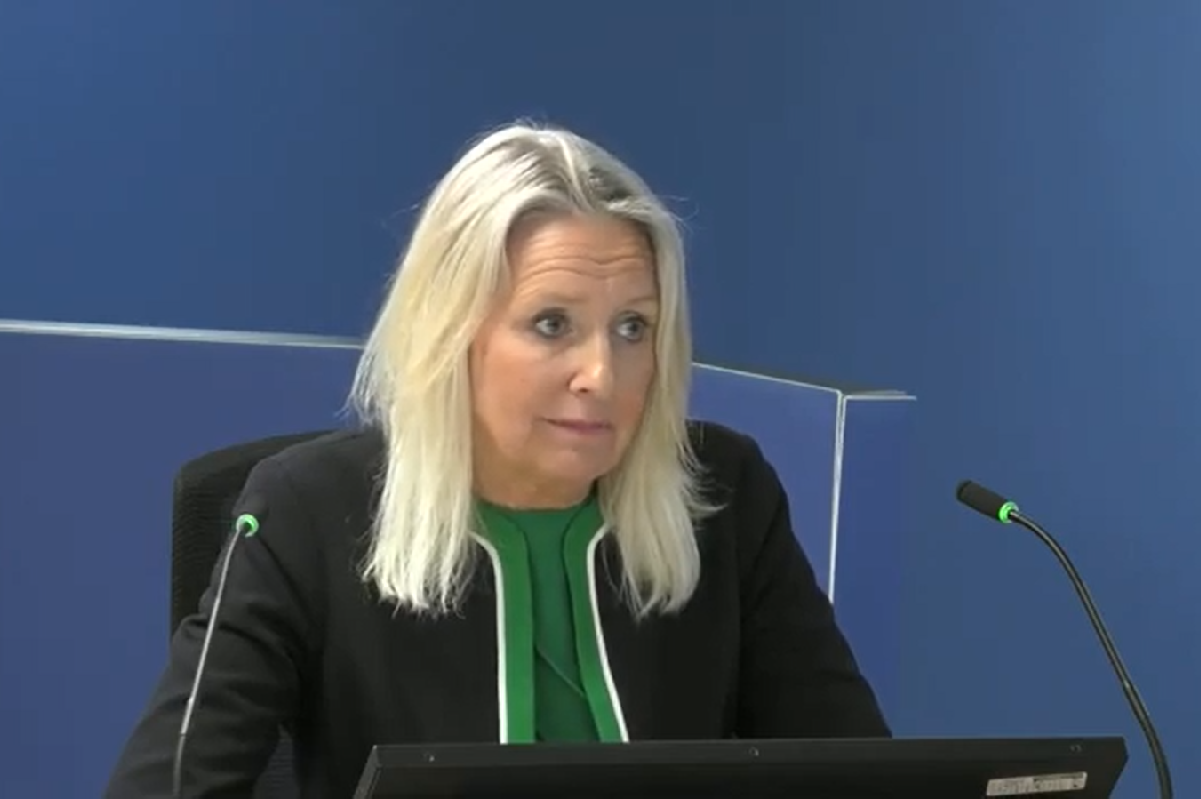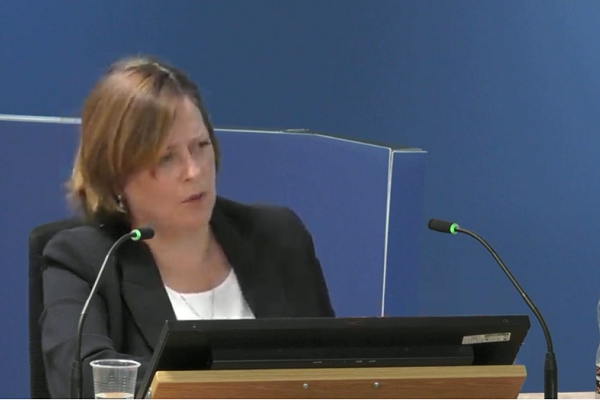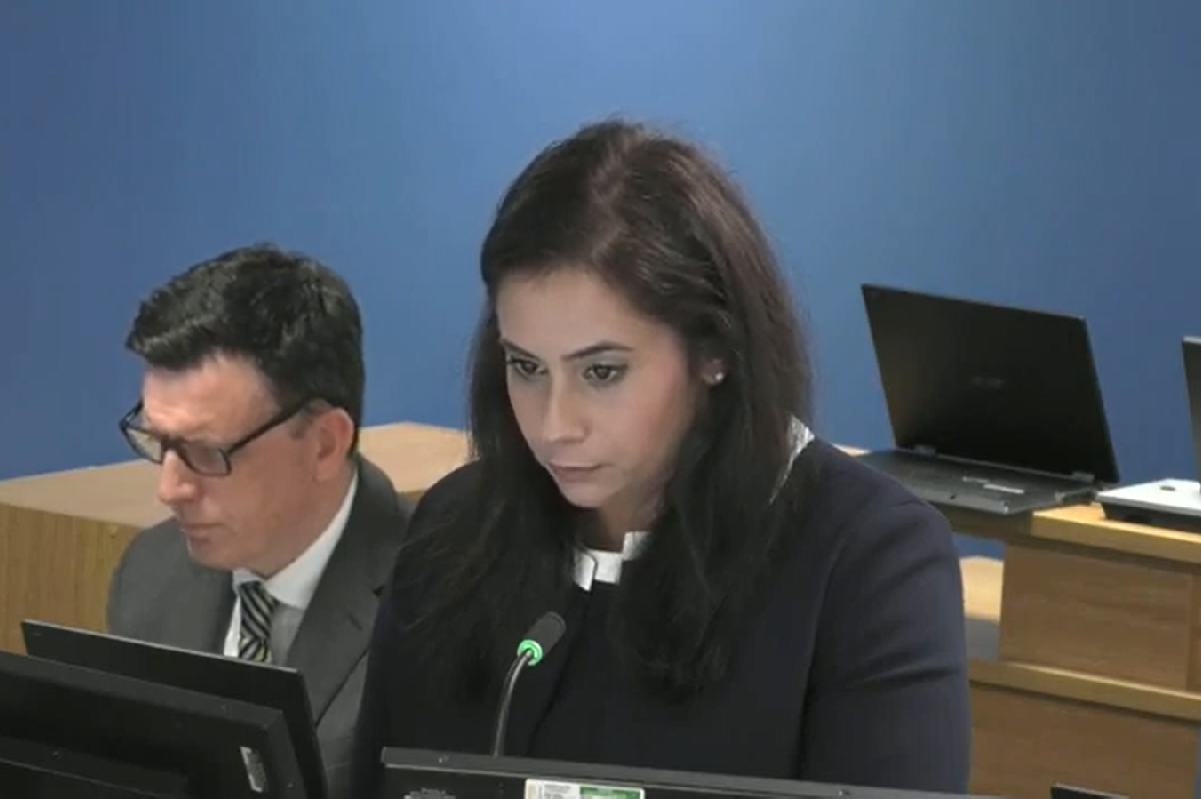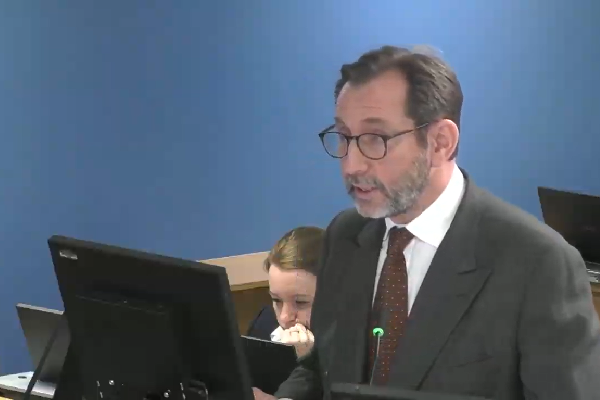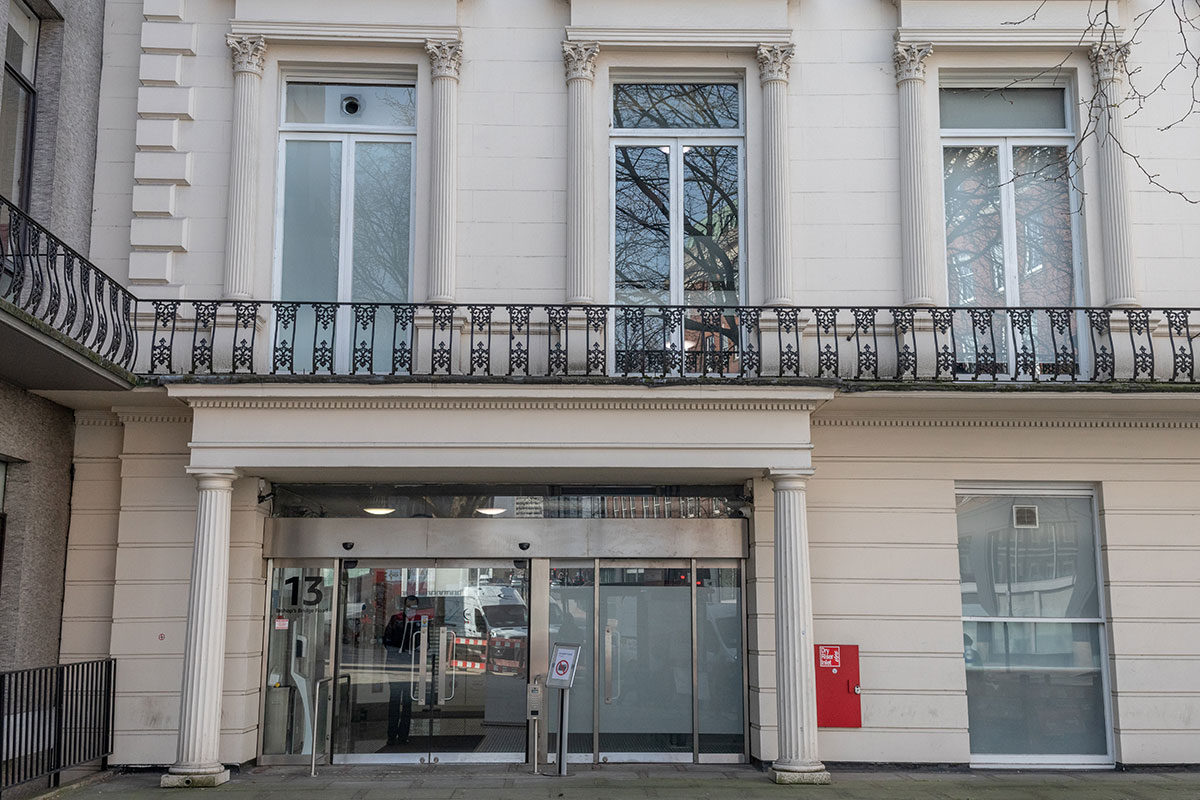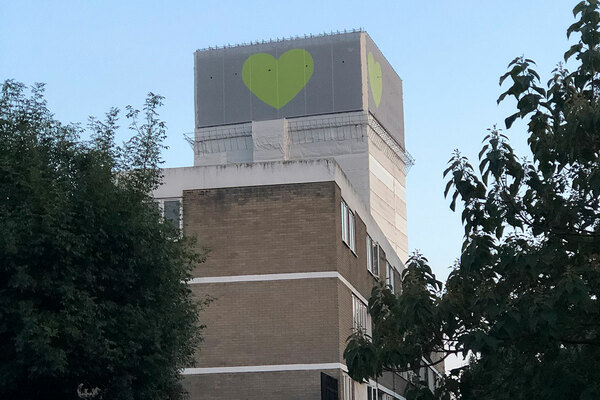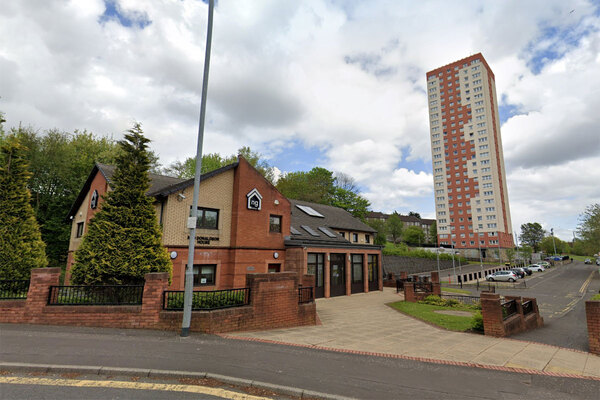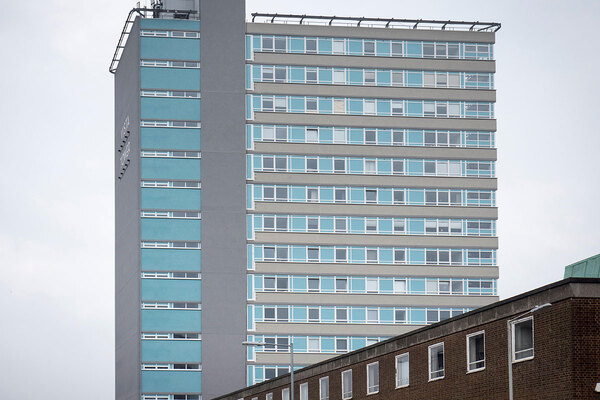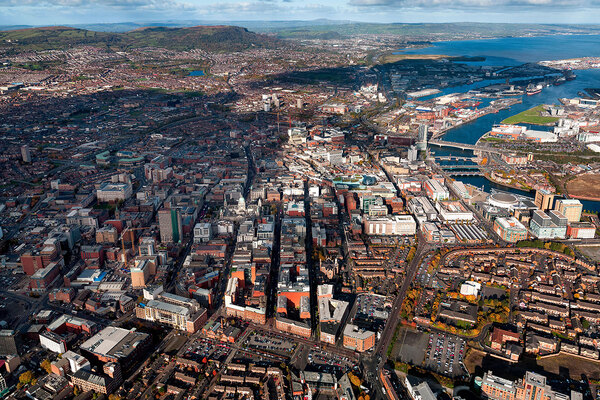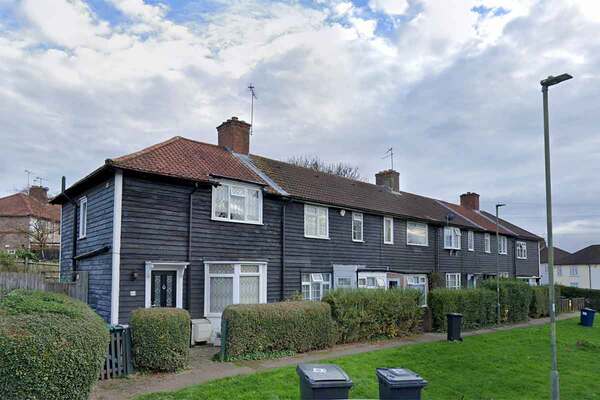Grenfell Tower Inquiry diary week 77: ‘The planning hadn’t been done and there was nothing for us to be drawing on’
The Grenfell Tower Inquiry’s examination of the aftermath of the fire concluded with witnesses from central government. Peter Apps reports
This week, the inquiry primarily focused on the actions of central government in the aftermath of the fire, with the examination of three civil servants involved in the response.
They were all in some way involved in the Resilience and Emergencies Division (RED), which sat within the Department for Communities and Local Government (DCLG).
The role of RED was to provide a liaison point between the local council, which had specific duties (such as opening and managing ‘rest centres’ for those displaced and arranging rehousing), and central government (which would monitor the situation and step in if necessary).
But as we have heard in minute detail over the past two months, the local response to Grenfell collapsed.
The Royal Borough of Kensington and Chelsea (RBKC) did not have a major staff presence at the tower, rest centres were chaotic, there was a vacuum of information and the rehousing process was botched from the start, with some of those displaced by the fire sleeping rough.
It has transpired that RBKC refused to call on external help, with its chief executive Nicholas Holgate telling colleagues “that looks like we can’t cope”.
The question for this week’s witnesses was how much they knew about this and whether they should have done more to address it.
‘The planning hadn’t been done and there was nothing for us to be drawing on’
A first point was how prepared the team was for a disaster like this.
Were its staff trained well enough? The inquiry heard that despite being “strongly encouraged” to undertake voluntary training by the Emergency Planning College (EPC), which delivers training on behalf of the Cabinet Office, only four RED staff members attended in 2014, 2015 and 2016.
Priya Malhotra, counsel to the inquiry, asked: “Considering training was strongly encouraged, would you agree this was a rather poor uptake?”
Gill McManus, a resilience advisor with RED, said: “It is low numbers. There [was] other central training that was on offer as well, which more staff would have taken up. But, yes, it isn’t a particularly high number.”
When Melanie Dawes (pictured above), former permanent secretary at DCLG, gave evidence she said the government was not prepared for the kind of disaster it faced at Grenfell Tower: one where a huge community of people permanently lost their homes.
“There was no precedent for an emergency that left so many households homeless and in crisis,” she said in her statement.
She was challenged over this by Richard Millett QC, lead counsel to the inquiry, who pointed out that emergency planning documents did envisage situations where large numbers of people were displaced.
Ms Dawes said Grenfell was particularly extreme, given that it involved social housing and occurred in a housing market with few easy options for rehoming.
“We had not previously thought through what a longer-term rehousing challenge might look like on this scale,” she said. “We had not rehearsed before what we would do if there was a huge rehousing challenge in a very, very expensive local authority that had almost no spare social housing.”
She went on to say that this hindered the response. “The planning hadn’t been done on either response or recovery, really, in my opinion,” she said. “And so there was nothing really for us to be drawing on.”
‘It’s important for our ministers to understand that DCLG carries significant policy responsibilities for fire protections standards’
What, then, of the day of the fire? Ms McManus (pictured above) was contacted by the duty officer at 3.30am to inform her of the developing fire.
But her immediate focus does not appear to have simply been the council’s response on the ground.
“We will need to put a note [together] at very least and will need to include building regs colleagues as I suspect there will be an investigation,” she wrote at 4.08am.
As the inquiry has heard at length, DCLG was also responsible for building regulations and the associated guidance – which would be thrown very much into the spotlight by the fire.
She mentioned in an email half an hour later that she was “looking for building regs contacts so we can give them [a] heads up”, and exchanged emails with Brian Martin, the official responsible for fire safety guidance, who wrote at 8.11am: “It’s important for our ministers to understand that DCLG carries significant policy responsibilities for fire protections standards and for social housing.”
“What would you say to the suggestion that your focus was more on building regulations at that time than questioning what the local authority was doing or having an eye to the recovery?” asked Ms Malhotra.
Ms McManus responded by saying that she was “very much focused on what was happening at the incident” and that part of RED’s role was “to ensure that those policy areas that have any input to provide do provide that”.
‘We were relying on it, but we weren’t looking to see whether it had happened’
Ms McManus notified Jo Farrar (pictured above), the deputy director for local government and an experienced local authority chief executive in her own right, at 5.55am on the day of the fire.
Her initial email outlined the fact that there were concerns about RBKC. “There are suggestions in the media that the cause of the fire could be neglect of health and safety legislation,” she wrote.
“Did you consider or anticipate at that early stage that there would be any problems with RBKC leading on the recovery, given that it was owner of the tower, and media reports that were circulating at the time suggesting the fire could have been caused by neglect?” asked Ms Malhotra.
Dr Farrar said that she did not, and that she believed the council would be calling on London-wide support through an arrangement in the capital known as London Resilience.
She then had a conversation with Ms Dawes, who “indicated that she knew Nicholas Holgate [the chief executive of RBKC] during her time at HM Treasury and would contact him to offer government’s support”.
Ms Dawes was asked about whether this prior relationship had any impact on her handling of the situation.
“Was it the case that you were more inclined to give him the benefit of the doubt or perhaps be more generous towards his management of the response than you otherwise would have been had you not known him?” asked Mr Millett.
“No, I don’t think that is the case at all,” Ms Dawes replied.
Ms Dawes then emailed Mr Holgate at 9.07am to offer support and asked him to “let us know – as and when is helpful – whether there is anything we can do”.
He responded, less than two minutes later, to say there was “plenty of blue light support at present”.
But DCLG was then unable to contact him directly throughout the rest of the first day. Dr Farrar texted and called him but did not get through. No one from RBKC attended the first meeting at 9.30am that morning.
As a result, they were unaware that RBKC was struggling to cope with the issue on its own – and not calling on the London-wide arrangements for support.
Ms Dawes accepted that this was a flaw in the government’s response: “We were relying on [the London-wide arrangements], but we weren’t looking to see whether it had happened, and I think that’s one of the big gaps that I feel Jo and I and others didn’t fill in those early days, is checking that those arrangements were there.”
Instead, the assumption was that since RBKC was not calling on the government for support, it did not need any.
Dr Farrar was informed by Ms Dawes at 3.30pm that RBKC “had the situation under control and didn’t need any central government support”. This was based solely on the 9.09am email from Mr Holgate.
In reality, on the ground, the situation was chaotic. Bereaved relatives faced hostile police officers, with no one around to give them information about their loved ones.
Rest centres were overwhelmed and uncomfortable, and the council was struggling to find suitable emergency accommodation – particularly for 845 people evacuated from the low-rise blocks next to Grenfell Tower.
‘I’m worried for the sake of the government as a whole what will happen if DCLG do start taking the lead’
By the next day, media reports of this situation were beginning to come through – and more senior levels of government were concerned.
At 9.12am, Sir Jeremy Heywood, the head of the civil service, emailed Ms Dawes to say: “Lots of concern here that [RBKC] is not gripping the aftermath re housing etc. Is that fair? Which of your ministers is now gripping this tightly?”
“When you received his email, did you share his concerns, or did they come as a surprise to you?” asked Mr Millett.
“This was quite early for us to be hearing those concerns, and so I don’t think – I think his email was probably one of the first that I saw that began to express those concerns,” said Ms Dawes. She did not reply to him until the end of the day.
“Why didn’t you get on to him by email in response and say, ‘What do you mean? What exactly is the problem?’” asked Mr Millett.
“Well, I don’t think I needed to. I think he was being quite clear, actually, that there were problems with rehousing, and we were hearing that from others as well. So, you know, I don’t know, really,” she said.
There were also concerns about DCLG itself. Sir Philip Rutnam, the permanent secretary at the Home Office, emailed his colleagues on the morning of 15 June to say: “I’m worried for the sake of the government as a whole what will happen if [D]CLG do start taking the lead. On the basis of yesterday there is a real risk they will comprehensively mess it up.
“Both [Sajid Javid, communities secretary] and [Ms Dawes] seemed, frankly, to be at risk of panicking.”
Ms Dawes said she believed these comments were due to her wish to immediately announce a public inquiry.
“We believed we needed a public inquiry; we believed we needed it to be set up as quickly as possible,” she said.
“I had discussed that with Sue Gray [then director general for propriety and ethics] at the Cabinet Office… Philip was of the view that this would not be a good idea, and that is what I think he means by me and my secretary of state panicking.”
DCLG continued to struggle to get in touch with Mr Holgate throughout the morning. Dr Farrar finally secured a call with him at 12.30pm. Her notes from the call reveal that he told her the council had “found hotel accommodation for everyone in need” and that this could “roll over for as long as needed” – meaning residents would not need to move out.
Prior evidence before the inquiry suggests neither of these statements to have been correct – particularly with regard to the 845 evacuated from the Walkways (the blocks neighbouring Grenfell Tower), some of whom had slept rough.
Dr Farrar’s notes from the call also recall that Mr Holgate said: “Grenfell Tower residents have been complaining for a long time about the council… Several people could make it worse than it is and the council is worried they might need assistance from the police.”
Dr Farrar said she found this “surprising”.
“His opinion was that there were people that were agitating the situation,” she said. “I mean, personally I felt that people would be agitated if there had been an incident of this size, and actually the job of the council is to provide reassurance to the community and to be visible to the community.”
She offered central government support twice during this call, which Mr Holgate declined. “He was very confident that they had all the support they needed,” she said.
“Was he hostile to the idea of central government support?” asked Ms Malhotra (pictured above).
“No, he didn’t seem hostile, just seemed very confident that it wasn’t needed,” Dr Farrar replied.
‘At risk of pedantry, it also doesn’t refer to the building correctly, does it?’
By this point, Theresa May’s team at Number 10 were becoming increasingly concerned about the response to the fire. They asked DCLG to provide a briefing about its actions so far.
This was provided at 3pm, with the one-page document referring erroneously to ‘Grenfell House’, rather than Grenfell Tower.
“At risk of pedantry, it also doesn’t refer to the building correctly, does it?” asked Mr Millett (pictured above).
“No, it doesn’t, and I find that… very jarring and I’m sure that those directly involved in the fire must find it potentially very offensive and very difficult and I’m very sorry about that. It’s an oversight which I can’t really explain,” Ms Dawes replied.
“Does it tell us anything about the degree of engagement of your officials?” asked Mr Millett.
“No, I don’t think so, but it perhaps speaks to a certain level of stretch that was going on in the teams. This doesn’t look to me like a note that’s had a great deal of senior oversight or checking,” she said.
As the inquiry has previously heard, Mr Holgate joined a call with central government at 3.30pm on 15 June – at which he was unable to answer questions, and confidence in his leadership fell away.
Dr Farrar was not at this meeting, but was informed about it by a colleague.
She said this was “where it was becoming clearer that he was the sole gold [command, the code for the most senior co-ordinator of a response] for local authority, so wasn’t drawing in other golds from other places, and that there were concerns that were wider than housing”.
“You say that it then became clear at this stage that he was the sole Local Authority Gold at that stage; what would you say about your situational awareness and the department’s situational awareness at the time?” asked Ms Malhotra.
“I think information was coming through that was conflicting with other information that we had been given, such as, you know, the support from London Resilience [a group that can offer London-wide support in emergencies], and it was becoming a bit more obvious that, actually, London Resilience were less involved,” Dr Farrar said.
The inquiry has heard that Mr Holgate belatedly activated the London-wide arrangements following encouragement to do so after this meeting and John Barradell, the chief executive of City of London, joined to support the response.
Dr Farrar visited the scene with ministers the next day and helped to ensure that full control of the incident was handed over to Mr Barradell, as opposed to him simply playing a supporting role to Mr Holgate.
The inquiry has heard that the response did not improve immediately after this point, with some issues continuing for many days, with witnesses putting this down to the initial difficulties taking time to unwind.
Ms Dawes said she believed the main issue with the response was the council’s failure to call on outside help, although she added that it was “not clear” exactly what could be done to remedy this.
“I don’t think this is straightforward, because you could go in and be too overbearing of a council that was actually doing a good job, and that could create problems itself,” she said.
‘I’m ashamed of the failure of the system I was part of to provide fellow citizens with the most basic support and comfort’
Earlier in the week, the inquiry heard from the only minister who will be called for this section of its work: the former police and fire minister Nick Hurd (pictured above).
Despite not being a cabinet-level minister, he chaired the first government meeting on the fire on 14 June. He said he felt this was a mistake.
“We are talking about a situation in which the country has woken up to one of the worst disasters in our memory,” he said.
“We all remember how we felt that day and I just felt that response was not proportionate to the anxiety, the trauma in the community and in the country, and that people expected to see a more senior level of leadership from the start.”
As stated above, the meeting was not attended by Mr Holgate and featured no conversation about critical issues such as the establishment of ‘rest centres’ to support the community.
“Of course, this is unforgivable in hindsight, but in the absence of anyone raising a problem, the conversation moves on,” said Mr Hurd.
Mr Hurd repeatedly said the meeting had not been given a clear enough picture about the struggles on the ground, which led to him later telling journalists that “the resources are in place and the capacity is in place to support people”.
“That meeting was not adequately informed by the ground truth of what was happening in the area,” he said. “To my eyes now, in hindsight, there were clear failures of intelligence in terms of bringing the right information to that meeting and therefore, unacceptable as it looks today because it reads terribly complacently, I could only report what the feeling of that meeting was.”
He said he first realised the council was struggling at the meeting the next day when Mr Holgate was unable to answer key questions about the response.
“This meeting was a defining moment,” said Mr Hurd. “This was the first time, effectively, the council was open to question… there was a growing concern about data and the reliability of numbers and he really wasn’t able to answer some questions that anyone might reasonably have expected him to answer.”
He too accepted that the problems continued after control was removed from Mr Holgate. “If you don’t get a grip on these things early, then it becomes very hard to reassert any sense that the system has gotten the situation under control,” he said. “I think the perceptions were set very early and were very difficult to shift.”
Mr Hurd, despite having stood down as an MP in December 2019, remains a special advisor to Boris Johnson on issues relating to Grenfell Tower.
Mr Millett asked if this role, which includes consideration of the recommendations of the inquiry, posed a conflict of interest given his role as a witness.
“Was any consideration given within central government to how it could be that you could be a factual witness to the inquiry, but at the same time be the prime minister’s independent advisor in respect of it?” Mr Millett asked.
Mr Hurd said his appointment was “rooted in a desire to see some continuity” amid a recognition that ministers had “come and gone” since the fire.
At the end of his evidence, Mr Hurd said: “I’m ashamed of the failure of the system I was part of to provide fellow citizens with the most basic support and comfort and they had every reason to feel totally entitled to in their darkest hour.”
What’s next?
This week’s evidence concludes Module Four – which has examined the aftermath of the devastating fire. It will not sit next week, before embarking on a module of evidence from expert witnesses, touching on a range of different subject areas.
The inquiry will then move to factual evidence covering the circumstances of the deaths of each of the victims of the fire. It is expected to conclude its oral evidence in July.
Sign up for our weekly Grenfell Inquiry newsletter
Each week we send out a newsletter rounding up the key news from the Grenfell Inquiry, along with the headlines from the week
Already have an account? Click here to manage your newsletters
Grenfell Tower Inquiry phase two: weekly diaries
Module one: the refurbishment
Week one: A vivid picture of a broken industry
After a week of damning revelations at the opening of phase two of the Grenfell Tower Inquiry, Peter Apps recaps the key points
Click here to read the full story
Week two: What is the significance of the immunity application?
Sir Martin Moore-Bick has written to the attorney general requesting protection for those set to give evidence at the Grenfell Tower Inquiry. Peter Apps explains what the move means
Click here to read the full story
Week three: Architects of misfortune
This week saw the lead architects for the Grenfell Tower refurbishment give evidence to the inquiry. Peter Apps runs through the key points
Click here to read the full story
Week four: ‘I didn’t have any perception that it was the monster it’s become’
The architects continued to give evidence this week, outlining a lack of understanding of the fire risk posed by the cladding materials and its design. Nathaniel Barker reports
Click here to read the full story
Week five: ‘No adverse effect in relation to external fire spread’
As the Grenfell Tower Inquiry returns from its long absence, Peter Apps recaps the key points from a week of important evidence from the fire consultants to the refurbishment
Click here to read the full story
Week six: ‘I can’t recall any instance where I discussed the materials with building control’
Nathaniel Barker summarises what we learned from fire engineers Exova, architects Studio E and the early evidence from contractor Rydon
Click here to read the full story
Week seven: ‘I do not think I have ever worked with a contractor operating with this level of nonchalance’
Two key witnesses from contractor Rydon gave evidence this week. Peter Apps recaps some of the key points from a revealing week of evidence
Click here to read the full story
Week eight: ‘It haunts me that it wasn't challenged’
Four witnesses from contractor Rydon gave evidence this week. Lucie Heath recaps what we learned on the last week of evidence before the inquiry breaks for five weeks
Click here to read the full story
Week nine: ‘All I can say is you will be taken out for a very nice meal very soon’
This week the inquiry heard evidence from witnesses at Harley Facades, the sub-contractor responsible for Grenfell Tower’s cladding. Peter Apps recaps the key points
Click here to read the full story
Week 10: ‘As we all know, ACM will be gone rather quickly in a fire!’
As the Grenfell Tower Inquiry entered its 10th week, Jack Simpson recaps the key points from a week of important evidence from the refurbishment’s cladding contractor
Click here to read the full story
Week 11: ‘Did you get the impression Grenfell Tower was a guinea pig for this insulation?’
With witnesses from the cladding subcontractor, the firm which cut the deadly panels to shape and the clerk of works which inspected the job giving evidence this was week full of revelations. Peter Apps recaps the key points
Click here to read the full story
Week 12: ‘Would you accept that was a serious failing on your part?’
With the surveyor who inspected Grenfell Tower for compliance giving evidence, this was a crucial week from the inquiry. Dominic Brady and Peter Apps report
Click here to read the full story
Week 13: ‘Value for money is to be regarded as the key driver for this project’
With consultants to Kensington & Chelsea Tenant Management Organisation (KCTMO) giving evidence, attention at the Grenfell Tower Inquiry turned for this first time to the actions of the TMO and the council. Peter Apps reports
Click here to read the full story
Week 14: ‘Did it not occur to you at this point that your budget was simply too low?’
This week, for the first time in phase two, the inquiry heard from Kensington & Chelsea Tenant Management Organisation, the landlord that oversaw the fatal refurbishment of Grenfell Tower. Lucie Heath reports
Click here to read the full story
Week 15: ‘Have you ever informed the police that you destroyed documents relevant to their investigation?’
Witnesses from the Kensington and Chelsea Tenant Management Organisation (KCTMO) gave evidence for a second week, which began with a shocking revelation about withheld and destroyed evidence. Peter Apps recaps
Click here to read the full story
Week 16: ‘I conclude this was very serious evidence of professional negligence’
This week saw members of Kensington & Chelsea Tenant Management Organisation finish giving evidence, before the inquiry’s expert witnesses took the stand to make some highly critical assessments of the work they had seen before and during the refurbishment of Grenfell Tower. Jack Simpson recaps
Click here to read the full story
Grenfell Tower: a timeline of the refurbishment
Following the conclusion of module one of the Grenfell Inquiry’s second phase, Peter Apps presents a timeline of the key moments during the fatal refurbishment of the west London tower block
Click here to read the full story
Module two: the cladding products
Week 17: ‘It’s hard to make a note about this because we are not clean’
The start of the second module of the Grenfell Tower Inquiry phase two came with some huge revelations about the companies that sold the products used in the cladding system. Peter Apps reports
Click here to read the full story
Week 18: ‘It was just reckless optimism wasn't it?’
As the inquiry began cross-examining witnesses for the second module of its phase two work, the picture surrounding just how Grenfell Tower ended up wrapped in such dangerous materials became a little clearer. Nathaniel Barker was keeping an eye on proceedings
Click here to read the full story
Week 19: ‘And that was intentional, deliberate, dishonest?’
The Grenfell Tower Inquiry this week heard the shocking story of how the insulation manufacturer “manipulated” official testing and marketed its product “dishonestly”. Peter Apps tells the story
Click here to read the full story
Week 20: ‘We were outed by a consultant who we then had to fabricate a story to’
This week the inquiry investigated the actions of Kingspan – the manufacturer of one of the insulation products used in the tower’s cladding system. Dominic Brady reports
Click here to read the full story
Week 21: ‘It’s there in black and white isn't it? We see a complete absence of any consideration of life safety’
The story of insulation giant Kingspan’s testing and marketing of its combustible insulation for high rises was unpacked in minute detail this week. Peter Apps reports
Click here to read the full story
Week 22: ‘All we do is lie in here’
In the third week of evidence from insulation giant Kingspan, the inquiry continued to uncover shocking details about the firm’s behaviour both before and after the Grenfell Tower fire. Lucie Heath reports
Click here to read the full story
Week 23: ‘That would have come as an earthquake to you at the time, would it not?’
This week the inquiry took its deepest dive yet into the inner workings of the cladding manufacturer whose product has been blamed for the terrible spread of fire up Grenfell Tower. Nathaniel Barker reports
Click here to read the full story
Week 24: ‘Do you accept that Test 5B was Arconic's deadly secret’
The president of the firm that made and sold the cladding panels installed on Grenfell Tower was asked to account for the apparent concealment of “disastrous” fire tests on the product this week. Peter Apps reports
Click here to read the full story
Week 25: ‘This is quite an incredible list of omissions and missed instances, isn’t it?’
This week the Grenfell Tower Inquiry heard its first witnesses from the Building Research Establishment (BRE) - the testing house which carried out key fire tests on the Kingspan and Celotex insulation products which were later used on Grenfell Tower. Peter Apps reports.
Click here to read the full story
Week 26: 'You were taking an enormous risk, weren't you?'
Week 26 at the Grenfell Tower Inquiry was a key moment in understanding how dangerous products used on the tower came to be accepted by industry professionals. Dominic Brady reports
Click here to read the full story
Week 27: ‘What will happen if one building made out [of] PE core is in fire and will kill 60 to 70 persons?’
The most explosive evidence this week at the Grenfell Tower Inquiry came from those who did not attend, as the evidence which would have been presented to Arconic witnesses was displayed in their absence. Peter Apps reports
Click here to read the full story
Week 28: ‘This is a serious safety matter’
This week the Grenfell Tower Inquiry zeroed in on the British Board of Agrément, the body that produced “misleading” certificates which inspired trust in both the cladding and insulation used on the tower. Lucie Heath reports
Click here to read the full story
Week 29: ‘Is it true that Kingspan’s position… was to do its best to ensure that science was secretly perverted for financial gain?’
The final week in this section of the Grenfell Tower Inquiry primarily examined the attempts by insulation manufacturer Kingspan to lobby government after the fire. Peter Apps reports
Click here to read the full story
How the products used in Grenfell Tower's cladding system were tested and sold
As the section of the Grenfell Tower Inquiry examining how the products used in the cladding system were tested, marketed and sold comes to a close, Peter Apps summarises what we have learned about each of the products included in the system
Click here to read the full story
Module Three: the management of the tower
Week 30: ‘There is certainly a high probability that in the event of a fire the whole building can become an inferno’
The focus of the inquiry shifted this week to the actions of the social housing providers responsible for maintaining Grenfell Tower. Pete Apps recaps what we learned
Click here to read the full story
Week 31: ‘If we cannot get out people will die’
This week saw the former residents of Grenfell Tower enter the witness box to tell of their experiences attempting to raise complaints with the council and its managing agent. Pete Apps reports
Click here to read the full story
Week 32: ‘Let's hope our luck holds and there isn't a fire’
This week saw the return of the landlord of Grenfell Tower, Kensington and Chelsea Tenant Management Organisation (KCTMO), as senior staff members attempted to explain how vital fire safety protections at the block were allowed to fall into disrepair. Lucie Heath reports
Click here to read the full story
Week 33: ‘Isn't that a serious gap in the scope of a policy meant to safeguard vulnerable people?’
A slightly disjointed week at the Grenfell Tower inquiry saw further evidence from staff at building manager Kensington and Chelsea Tenant Management Organisation (KCTMO) interspersed with the views of a cladding expert. Peter Apps reports
Click here to read the full story
Week 34: ‘Some members of the community are doing their best to spread false information’
Jack Simpson covers all the major revelations from the past week of evidence at the Grenfell Inquiry, including evidence from Laura Johnson, director of housing at the Royal Borough of Kensington and Chelsea.
Click here to read the full story
Week 35: ‘I really didn’t like the champagne’
This week the Grenfell Tower Inquiry saw council witnesses, including former deputy leader Rock Feilding-Mellen and leader Nicholas Paget-Brown, questioned about their role in the story for the first time. Peter Apps reports
Click here to read the full story
Week 36: ‘Is that not a very incurious approach for a fire risk assessor?’
This week the Grenfell Tower Inquiry scrutinised the work of Carl Stokes, the man hired to carry out fire risk assessments for the block. Nathaniel Barker reports
Click here to read the full story
Week 37: ‘In giving that advice, weren’t you acting beyond your knowledge and expertise?’
A curtailed week at the Grenfell Tower Inquiry saw fire risk assessor Carl Stokes grilled over advice he gave regarding the tower’s cladding. Peter Apps reports
Click here to read the full story
Week 38: ‘Well it’s a bit more than that, isn’t it. He’s suggesting that you tell the LFB a lie’
The inquiry heard the mammoth cross-examination of KCTMO’s health and safety manager Janice Wray this week. Peter Apps reports
Click here to read the full story
Week 39: ‘What you said there was a grotesque understatement’
This week the inquiry continued to hear from former employees of Kensington and Chelsea Tenant Management Organisation, as well as two employees from the London Fire Brigade. Lucie Heath reports
Click here to read the full story
Week 40: ‘An exercise in concealment and half-truth’
Former KCTMO chief executive Robert Black gave his evidence to the inquiry this week and was asked to account for the various failures described over the previous six weeks. Peter Apps and Nathaniel Barker report.
Click here to read the full story
Week 41: ‘We should do nothing. This is not the sort of website we should be responding to’
This week saw the return of Robert Black, chief executive of Kensington and Chelsea Tenant Management Organisation (KCTMO), before the inquiry turned its attention to the defective smoke control system in the tower. Dominic Brady reports
Click here to read the full story
Week 42:‘They would leak as much as they leaked. They were what they were’
The Grenfell Tower Inquiry continued its in-depth investigation of the tower’s non-compliant smoke control system this week, with evidence from the various contractors involved in delivering it. Pete Apps reports
Click here to read the full story
Week 43:‘Contractors at the time were not generally aware of the importance of leaving holes unsealed’
This week the inquiry focused on two of the more overlooked areas of the Grenfell Tower fire, with evidence focusing on the gas pipelines and lifts within the west London block. It was a packed week, with five witnesses giving evidence. Jack Simpson reports
Click here to read the full story
Week 44:‘I've never seen a fully compliant firefighting lift in any local authority building, to this day actually’
This week the inquiry turn the focus onto the building’s defective lifts, with evidence from an expert, contractors who worked on them and a former engineer at KCTMO. Pete Apps reports.
Click here to read the full story
Week 45: ‘Don’t you find all this rather a surprising debate, given that the Equality Act was passed in 2010?’
The inquiry heard from expert witness Colin Todd this week, who gave his views about the work of risk assessor Carl Stokes as well as answered questions about his own guidance. Peter Apps and Nathaniel Barker report
Click here to read the full story
Week 46: ‘I think I've been very, very clear that is completely wrong’
This week the inquiry heard further expert evidence about fire risk assessor Carl Stokes’ actions, as the section of its work covering the management and maintenance of the tower concluded. Peter Apps reports
Click here to read the full story
Six key failures in the way Grenfell Tower was managed before the fire
Peter Apps recaps some of what we have learned about the actions of the Royal Borough of Kensington and Chelsea (RBKC) and Kensington and Chelsea Tenant Management Organisation (KCTMO) in the years before the fire.
Module one and two closing statements
Week 47: ‘An unedifying spectacle’
After a week of closing statements from the core participants involved in modules one and two, Lucie Heath recaps the key arguments of each group
Click here to read the full story
Module five: the fire brigade
Week 48: ‘They knew, and lives could and should have been saved’
The phase of the Grenfell Tower Inquiry examining the actions of the London Fire Brigade in the years before the fire kicked off this week with some major revelations. Peter Apps reports
Click here to read the full story
Week 49: ‘I'm not sure we've always taken every opportunity to learn as an organisation’
How the London Fire Brigade acted upon lessons from incidents in the years before the Grenfell Tower disaster came under the microscope this week at the public inquiry. Nathaniel Barker reports
Click here to read the full story
Week 50: ‘There is a culture in LFB that is very conservative. I think there is great comfort in what is familiar’
This week the inquiry heard how the London Fire Brigade (LFB) elected not to issue warnings about dangerous cladding before Grenfell and a detailed examination of its policy for checking high risk buildings. Pete Apps reports.
Click here to read the full story
Week 51:‘We teach firefighters to expect building failure’
An unusually brief week of evidence at the Grenfell Tower Inquiry explored how a fire service neighbouring London was taking a different approach to tackling blazes in high rises. Nathaniel Barker reports
Click here to read the full story
Week 52: ‘I actually think that there is a measure of incompetence at all levels’
Expert evidence concluded the current section of the inquiry with some stinging criticism of the London Fire Brigade (LFB). Pete Apps and Grainne Cuffe report.
Click here to read the full story
Module six: fire services
Week 53: ‘They make for chilling reading and harrowing listening’
The inquiry’s investigation into central government began this week with lawyers setting out their view on how and why firefighting policies failed. Peter Apps and Lucie Heath report
Click here to read the full story
Week 54: ‘Our consideration of evacuation at this time was something of a blind spot’
The development of policy on ‘stay put’, both nationally and for London, occupied the attention of the inquiry this week. Peter Apps reports
Click here to read the full story
Week 55: ‘My review is pretty scathing!’
In a week that included the 200th day of evidence in phase two of the inquiry, attention turned to the London Fire Brigade’s control room. Lucie Heath reports
Click here to read the full story
Week 56: ‘Why didn't we thump the table harder’
This week, the control room at the London Fire Brigade was examined further – both before and after the fire. Pete Apps and Lucie Heath report
Click here to read the full story
Week 57: ‘It was worse than slow, it was sluggish’
Former London Fire Brigade (LFB) commissioner Dany Cotton was the star witness this week, as the inquiry continued to delve into the brigade’s knowledge and training before the Grenfell Tower fire. Jack Simpson, Grainne Cuffe and Pete Apps report
Click here to read the full story
Week 58: ‘I don't think we deserve to ask for trust until we demonstrate different outcomes’
A current and former commissioner of the London Fire Brigade (LFB) wrapped up the inquiry’s investigation into the actions of the brigade before the fire. Grainne Cuffe and Peter Apps report.
Module six: testing and government
One of the major scandals of our time: key revelations as the Grenfell Tower Inquiry turns to government
The government was accused of “covering up” the risks of dangerous cladding as its “unbridled passion for deregulation” left it a “junior party” to the construction industry as the latest phase of the public inquiry opened today. Peter Apps summarises some of the main points
Click here to read the full story
Week 59: ‘Recent tests have apparently shown it continued to burn for 20 minutes after the flame was taken away’
After shocking opening statements, the Grenfell Tower Inquiry turned its attention to the work of Local Authority Building Control. Pete Apps reports
Click here to read the full story
Week 60: ‘You could have an exact repeat of the Dubai fire in any number of buildings in London’
The Grenfell Tower Inquiry turned its attention to the work of the National House Building Council this week, with shocking revelations about the extent of the warnings issued to central government before the fire. Peter Apps reports
Click here to read the full story
Week 61: ‘Mistakes are meant for learning, not repeating’
In the first hearings of the new year, the Grenfell Tower Inquiry heard closing statements from the firefighting section of phase two. Lucie Heath reports
Click here to read the full story
Week 62: Did it ever occur to you that this act of collaboration was, in one sense, corrupting?
The Grenfell Tower Inquiry returned to the work of the National House Building Council (NHBC) this week, with a new shocking revelation about the government’s actions in the immediate aftermath of the fire. Peter Apps reports
Click here to read the full story
Week 63: ‘It came after the general move to deregulation. So more regulation was not welcome’
The government’s focus on deregulation before the Grenfell Tower fire was placed in the spotlight this week with a series of shocking revelations about its failure to amend fire safety guidance. Pete Apps and Grainne Cuffe report
Click here to read the full story
Week 64: ‘I didn’t think ACM would be suitable for use in any high-rise buildings. I don’t think anyone did’
This week, the Building Research Establishment’s Dr Sarah Colwell gave more than three days of evidence, with some huge revelations about what was known about the dangers of aluminium composite material years before the fire and the mass confusion over the government’s building regulations. Peter Apps and Jack Simpson report
Click here to read the full story
Week 65: ‘Unless the government does something now about ACM panels, people will die’
Further evidence from the Building Research Establishment and the first government witnesses added new depth to our understanding of how warnings were missed before the Grenfell Tower fire. Peter Apps reports
Click here to read the full story
Week 66: ‘Was there a cover-up?’
The latest evidence from the Grenfell Tower Inquiry tracked the government’s failure to act on fire safety warnings right up until the months before the fire. Peter Apps and Grainne Cuffe report
Click here to read the full story
Week 67: ‘When exposed to a fire, the aluminium melts away and exposes the polyethylene. Whoosh!’
This week the inquiry heard disturbing new evidence about the failure of senior government officials to act on warnings about dangerous cladding in the years before the Grenfell Tower fire. Peter Apps reports
Click here to read the full story
Week 68: ‘Can we agree that was a pretty dangerous thing to have, all this falling on one man’s shoulders?’
Three senior civil servants gave evidence this week, including the official who had responsibility for building regulations guidance on fire safety in the years before Grenfell. Peter Apps, Lucie Heath, Stephen Delahunty and Grainne Cuffe report
Click here to read the full story
Week 69: ‘It was just unthinkable. You had the makings here of a crisis you could not comprehend’
This week, civil servant Brian Martin gave his long-awaited evidence to the Grenfell Tower Inquiry. Peter Apps reports
Click here to read the full story
Week 70: ‘Show me the bodies’
An important week at the Grenfell Tower Inquiry saw a dramatic conclusion to the mammoth cross-examination of civil servant Brian Martin, as well as the first politicians. Peter Apps and Lucie Heath report
Click here to read the full story
Week 71: ‘I have changed my schedule to fit this in. I do have an extremely busy day meeting people’
Three politicians who were responsible for building regulations before Grenfell appeared before the inquiry this week, including the former communities secretary Eric Pickles, who responded to the coroner’s letter following the Lakanal House fire. Peter Apps and Lucie Heath report
Click here to read the full story
Module Four: aftermath
Week 72: 'The system isn't broken. It was built this way'
This week the inquiry turned to the shocking story of the lack of support for bereaved and survivors in the immediate aftermath of the Grenfell Tower fire. Peter Apps, Lucie Heath, Grainne Cuffe and Jack Simpson report
Click here to read the full story
Week 73: ‘Most people would regard that as hopeless’
This week, the Grenfell Tower Inquiry heard about the Royal Borough of Kensington and Chelsea’s chaotic response in the immediate aftermath of the blaze, from the staff responsible for it. Pete Apps, Stephen Delahunty and Grainne Cuffe report
Click here to read the full story
Week 74: ‘Do you agree that RBKC was ill-prepared and incapable to meet its duties’
This week, Nicholas Holgate, former chief executive of the Royal Borough of Kensington and Chelsea, was grilled on his failure to hand over control of the aftermath of the fire, despite the borough’s lack of capacity. Peter Apps reports
Click here to read the full story
Week 75: ‘It still shocks me to the core that that’s how we treat our citizens in this country’
This week the inquiry heard witnesses from the housing management body discuss their role in the aftermath of the Grenfell Tower fire, followed by a range of witnesses from other organisations which supported the response. Peter Apps and Grainne Cuffe report
Click here to read the full story
Week 76: ‘I fear this will become our New Orleans’
This week the inquiry heard from central government figures and members of the London-wide emergency response arrangements. Peter Apps and Grainne Cuffe report
Click here to read the full story
Week 77: ‘The planning wasn’t done and there was nothing for us to be drawing on’
The Grenfell Tower Inquiry’s examination of the aftermath of the fire concluded with witnesses from central government. Peter Apps reports
Click here to read the full story
Module seven: expert evidence and closing statements
Week 78: ‘The abandonment of the ‘stay put’ strategy for high-rise residential buildings is essential’
This week the Grenfell Tower Inquiry heard a range of expert witnesses discuss their reports. Peter Apps and Grainne Cuffe report
Click here to read the full story
Week 79: ‘You could argue the system was created to enable people to circumvent the rules’
The Grenfell Tower Inquiry continued to hear expert evidence this week, with two senior figures in the world of fire safety academia criticising the government’s approach before and after the blaze. Peter Apps and Grainne Cuffe report
Click here to read the full story
Week 80: ‘The evidence points to wilful blindness and complacency towards safety’
As the inquiry moves into its final stages, lawyers for the key players gave statements about the evidence surrounding central government. Peter Apps reports
Click here to read the full story
Week 81: ‘This is Islamophobia. It’s racism. It is the elephant staring back at us in the room’
This week, closing statements covering the aftermath of the fire delivered a shocking new revelation and an expert toxicologist gave his views on the causes of the deaths. Peter Apps reports
Click here to read the full story
Module eight: further evidence relating to the deceased
Week 82: ‘Their chance to hear about the circumstances in which their loved ones died is the culmination of five years of waiting’
The Grenfell Tower Inquiry moved into its final module this week, with evidence relating to the circumstances in which the victims died. Peter Apps reports
Click here to read the full story
Week 83: ‘They died together as they lived: caring for one another’
A second week of evidence relating to the circumstances in which the victims of the fire died delivered more heartbreaking stories about their final moments. Peter Apps recaps
Click here to read the full story
Week 84: ‘Every decision affects someone who is an adored child, a beloved sister, a respected uncle, a needed mother’
The final week of oral evidence for the Grenfell Tower Inquiry’s second phase contained more heartbreaking evidence about the deaths in the tower. Peter Apps reports
Click here to read the full story
Closing statements
Week 85: ‘The merry-go-round turns still, the notes of its melody clearly audible in the last few days’
The Grenfell Tower Inquiry returned this week for closing statements from lawyers representing the bereaved and survivors and the various parties under scrutiny for the fire. Pete Apps reports.
